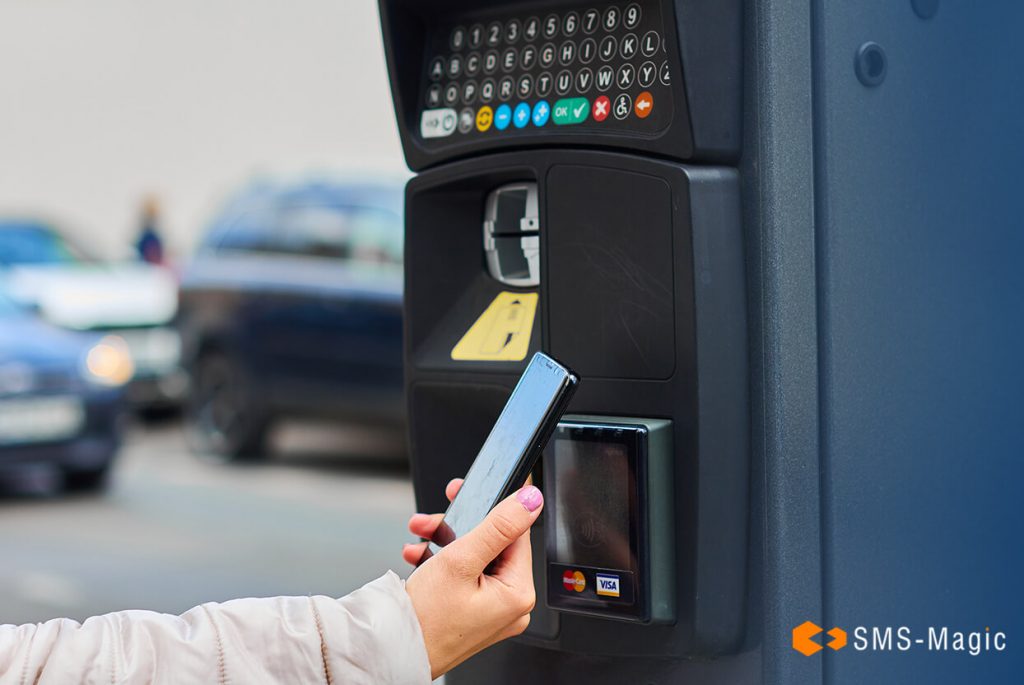Have you used text messages to pay for parking yet? The service has come to cities all over the U.S. and provides a convenient way to pay for street-level parking. It’s one of the many ways text messaging is being used beyond talking with friends and family in our daily lives.
We’re always interested in how companies are using text messaging, and when one of our team members parked recently, she was directed by a sign on the parking meter to text her location to the parking company. That started a text interaction that allowed her to pay for her parking space. And if she needed more time, she could text her payment without returning to her car.

Because she works for SMS-Magic, she was interested to see that the parking company didn’t ask for permission to text her. That’s because text conversations initiated by the consumer don’t require permission; consent is implied because the consumer acted first. Our colleague knew, however, that almost every other contact requires the consumer to “opt in” to receiving messages.
The dilemma is that a company can’t text a customer to ask for permission. So how do you get your customers, clients, patients or prospects to say “Yes” to the texts?
You must have “express written consent” before your company can legally send text messages to anyone. That means more than just asking for their phone number. And it doesn’t matter who it is – an existing customer, a former client, a trade-show lead, or someone on a purchased marketing list. Before that first text message goes out, your customer must say it’s okay.
Why? The U.S. Congress created the Telephone Consumer Protection Act to combat unsolicited phone calls. Through the years, however, the Act has expanded to include new technologies like text messaging. It contains specific restrictions and penalties that companies ignore at their peril. The fines can be as much as $1,500 per message sent. In one of the first class-action lawsuits concerning texting, Papa John’s settled the case against it for $16.5 million in 2013.
But you can secure permission with a few simple steps:
The more you automate these processes, the happier your staff will be.

Of course, you’ll also need to keep a list of everyone who has given you permission to text – and everyone who hasn’t. If you’re ever challenged, you’ll need to be able to prove you only send texts to customers who have opted into receiving text messages.
Receiving, logging and responding to messages from your customers may seem daunting, but SMS-Magic is designed to make it easy by working seamlessly with your CRM. SMS-Magic not only receives and sends text messages, it logs messages so that anyone in the system can see what has been sent to whom.

In addition, if your customer-service reps are working on a complicated matter, the system will log all interactions, including phone calls and emails, eliminating the need for the customer to explain the situation every time they change reps. It saves hours of needless work.
SMS-Magic works seamlessly with Salesforce and Zoho and has the capability to work with most systems. We can help you even if you don’t use a CRM at all.
Does SMS-Magic sound like the partner you’ve been looking for? We hope so!
Contact us to set up a demo or to start your free trial. Let us show you why your compliance worries will disappear with SMS-Magic!
Recent Comments
Interdum luctus accu samus habitant error nostra nostrum
Lance BogrolDoloremque velit sapien labore eius lopren itna
Lance BogrolInterdum luctus accu samus habitant error nostra nostrum
Fletch SkinnerInterdum luctus accu samus habitant error nostra nostrum
Chauffina CarrDoloremque velit sapien labore eius lopren itna
Hans Down